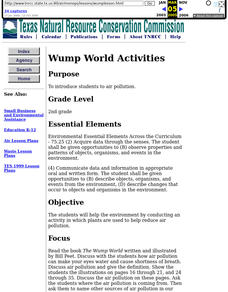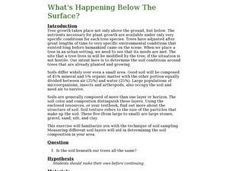Curated OER
State Of The Bay
Middle schoolers investigate the environmental problems that surround the Chesapeake Bay area. They use an environmental handout as a resource that should be supplemented with research. Also students ask specific questions to report...
Curated OER
Amphipods
Students identify organisms that live at the bottom of the body of water. In this biology lesson, students evaluate the effects of pollution to amphipods population. They examine collected data and create a bar graph comparing them.
Curated OER
Effect of Acid Rain on Plants
Students observe the effects of acid rain on plants through experimentation and research. Students research types of crops in their area. Students work in small groups to complete the experiments given, as well as write a report and...
Curated OER
Teaching about the Chemistry of Oxygen Solubility
Students explore solubility of gases in water, Henry's Law, LeChatelier's Principal, and supersaturation of gases in water.
Curated OER
Sediment Tubes
Students observe how different density soils and rocks behave in wind and in water. They make predictions and careful observations as they explore sediment transport and sediment rates in streams and rivers.
Curated OER
Current Events and Fish
Fifth graders examine current events impacting aquatic life in their communities. They search for newspaper, magazine and television reports for information about aquatic life in local bodies of water. Students can write letters to...
Curated OER
Environment
Fifth graders receive a general overview of the world's environmental dilemmas thereby understanding the global implications of their actions. They examine their connection to the ecosystem by looking at the influence of the environment...
Curated OER
Using Maps To Make Public Health Decisions Case Study: Wildfires in Mexico 2000
Students study environmental health. Using actual NOAA satellite imagery, students investigate the basic concepts of mapping. They explore the relationship between monitoring satellite images and public health decision making.
Curated OER
The Energy Debate - Conclusion
Students write a persuasive essay about the choices in the energy debate. They comprehend the environmental consequences that accompany the decision. Students predict how they will power their future.
Curated OER
Endangered Species- Florida Panther
Students investigate the concept of the conservation of the Florida Panther and examine the effects of the Everglades water restoration project. They conduct a web based activity that includes the following: Listing what they know,...
Curated OER
We Are All Responsible
Pupils conduct research about the issue of conservation and the environment. They focus upon the interdependence of man and nature. They write and discuss the issue of environmental preservation. Students appreciate the importance of...
Curated OER
It's For the Birds
Fifth graders examine how anatomical adaptations make it possible for a bird to survive in various habitats. They discuss and list birds and their unique characteristics, and create an imaginary bird, illustrating the environmental...
Curated OER
Wetlands Project
Young scholars discover how wetlands filter out contaminants before they can reach other bodies of water. In groups, they design and build a model of a stormwater wetland. They test the water quality and inform their classmates about...
Curated OER
Food and Fiber: Helping the Environment and You
Fourth graders explore the many uses of corn-based products and the importance of water resources. They consider how biodegradable products help to keep water clean. They perform experiments to observe how corn pellets dissolve while...
Curated OER
Air Pollution and Health
Middle schoolers use Internet research to become familiar with the environmental and health effects of the six criteria pollutants identified by the U.S. EPA, along with the greenhouse effect and carbon dioxide.
Curated OER
The Hazardous Waste Dilemma
Students discuss the characteristics of a hazardous waste site and how they can cause health problems to humans. In groups, they research the various ways to deal with the hazardous materials and read recent articles on the subject. To...
Curated OER
Wump World
Second graders read ead the book The Wump World written and illustrated by Bill Peet. Discuss with the students how air pollution can make your eyes water and cause shortness of breath. Students discuss air pollution and give the...
Curated OER
Marine & Aquatic Habitats Activities - Estuaries Are for the Birds!
Learners recognize that birds act as indicators of pollution because of their sensitivity to environmental change, and role play the manner in which marine debris can be hazardous to waterfowl.
Curated OER
What's Happening Below The Surface?
Young scholars determine the soil composition of soil layers in their area. They collect soil samples, calculate the percentage soil water content, analyze data, and evaluate each site for future tree growth.
Curated OER
Revised “Understanding Nutrition” Activity
Students evaluate their current food choices. In this health science lesson, students test different drinks to rate the amount of Vitamin C content. They discuss results in class.
Curated OER
Heat from Light
Second graders explore solar energy. In this science lesson, 2nd graders use hand lenses to see that light energy can be converted to heat energy.
Curated OER
Population Dynamics of Growth of Drosophila
Students investigate population dynamics such as variation in density of females, composition of food sources an environmental factors such as light and temperature on Drosophila. They then relate their findings to human populations and...
Curated OER
Capillary Action and Adhesion
Students perform classroom experiments to observe adhesion. They perform a second experiment using sand, salt, water, and a heat lamp to observe the principle of capillary action. They also experiment with adhesion in plants.
Curated OER
100 Things You Can Do to Save the Planet
Students examine the possible ways to recycle, reuse, and re-imagine products and objects in order to reduce pollution and waste on our planet. In this 100 things you can do to save the planet lesson plan, students take three actions to...























